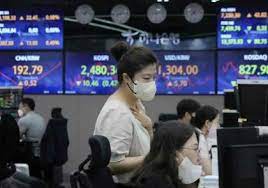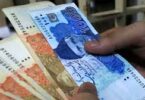New York (AFP): Wall Street bounced but European markets wobbled Thursday as investors weighed fresh interest rate hikes by central banks and signs of a possible pause in US monetary tightening following turmoil in the banking sector.
Central bankers chose to continue their battle against inflation, even as investors had hoped for a halt, over concerns that rate hikes could further rock the banking system following the collapse of three US regional lenders this month.
The Bank of England and Norway’s central bank raised their rates by a quarter point on Thursday, after a similar move by the US Federal Reserve the day before and a heftier half-point hike by the European Central Bank last week.
Switzerland’s central bank went with a half-percentage-point increase as it declared that authorities had “put a halt to the crisis” at Credit Suisse after co-engineering the embattled bank’s buyout by domestic rival UBS over the weekend.
“The Fed Reserve, along with the major central banks, is clear in its position that the recent turmoil does not pose a risk to the wider financial system,” said Richard Flax, chief investment officer at wealth manager Moneyfarm.
The central banks appear “confident in the higher capital and liquidity standards in place today when compared with the Global Financial Crisis” of 2008, he added.
Wall Street’s main indices closed higher on Thursday after slumping a day earlier following the Fed’s rate announcement.
The tech-heavy Nasdaq climbed 1.0 percent while the broad-based S&P 500 ticked up 0.3 percent.
In Europe, London finished the day 0.9 percent in the red as the BoE acknowledged that “uncertainties around the financial and economic outlook have risen”.
Paris added 0.1 percent, while Frankfurt was flat.
The US markets are “betting that we have reached a peak in terms of rate hikes and that from here, looser monetary policy should follow,” said Fawad Razaqzada, analyst at City Index and Forex.com.
While the US, Swiss and UK central banks all hiked interest rates, “the message from these banks was the same: more increases may be required, not will be, if inflationary pressures persist,” he added.
Fed chief Jerome Powell warned Wednesday that the banking sector’s woes were likely to bring “tighter credit conditions for households and businesses” that would affect “economic outcomes”.
He also said there needed to be more supervision and regulation of banks to prevent another crisis.
But the Fed also signaled it could soon pause rate hikes as its accompanying statement replaced a previous warning about the need for “ongoing increases” with a conditional one saying “some additional policy firming may be appropriate.”
“They effectively said that they are going to pause or step back after they raise interest rates one more time,” economist Hugh Johnson told AFP.
“That’s a positive signal and it’s the reason why the market has performed reasonably well today,” he added.
Market jitters remain over rising rates because they are widely regarded as a catalyst behind the collapse of Silicon Valley Bank (SVB), the sector’s biggest failure since the 2008 financial crisis.
“Uncertainty in the banking sector has undoubtedly altered the outlook for monetary policy,” said Pushpin Singh, economist at the Centre for Economics and Business Research, a London think tank.
This is because central banks will have to balance their mandate of reining in inflation while ensuring financial stability, he said.
Nerves were also jangled on Wednesday when US Treasury Secretary Janet Yellen declared that authorities were not looking at a blanket increase in deposit insurance for banks. But on Thursday, Yellen told a House subcommittee hearing that authorities would be “prepared to take additional actions if warranted” to prevent contagion in the financial sector.







